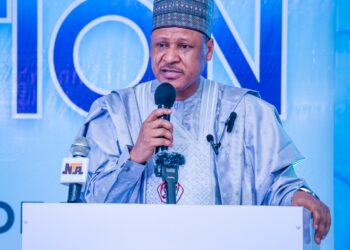In a significant move that underscores Nigeria’s commitment to addressing climate change, President Bola Ahmed Tinubu alongside a robust federal government delegation were in Dubai for the COP28. Contrary to public scepticism, the Minister of Information and National Orientation Mr Mohammed Idris emphasized that the presence of top government officials was not a mere jamboree but a focused endeavour for the country’s overall benefit.
The size of the Nigerian delegation has been a subject of discussion, prompting the minister to provide clarity. He said that the federal government-sponsored contingent consists of 422 individuals, spanning government officials, private sector representatives, civil society, media, and more. This diverse group reflects Nigeria’s multifaceted approach to climate action.
The minister emphasized Nigeria’s substantial stake in climate action, given its status as Africa’s largest economy and most populous country. With a considerable extractive economy and vulnerability to climate change, Nigeria’s active participation at COP28 is deemed essential.
The minister stressed that COP28 was not just a gathering but an opportunity for Nigeria to explore investment and partnership avenues crucial for sectors affected by climate change.
One notable achievement highlighted by the minister is the accelerated performance agreement signed between Nigeria and Germany to implement the Presidential Power Initiative (PPI). This initiative is aimed at enhancing Nigeria’s electricity supply, a critical aspect of the nation’s development. The agreement, witnessed by President Tinubu and Chancellor Scholz, signals a commitment to addressing the pressing issue of power generation.
Moreover, President Tinubu’s engagement at COP28 goes beyond symbolic representation. The high-level meeting on the Nigeria Carbon Market and the Electric Buses Rollout Programme demonstrates a proactive approach to climate solutions.
do you The President unveiled the Nigeria Carbon Market Activation Plan, showcasing Nigeria’s commitment to sustainable initiatives aimed at reducing carbon footprint and modernizing infrastructure.
The Electric Buses programme is a noteworthy step toward clean and sustainable transportation. The minister highlights its significance in addressing climate change challenges while positioning Nigeria as an attractive destination for global investments. This initiative aligns with the broader vision of simultaneously tackling climate-related issues and modernizing key sectors.
Again, the Loss and Damage Fund, operationalized during COP28, emerges as a substantial opportunity for Nigeria. The fund, established in the previous COP-27, promises non-debt financing to support countries severely impacted by climate change. Minister Idris notes that significant financial pledges have already been made, offering hope for effective climate adaptation strategies.
President Tinubu’s diplomatic efforts extend beyond the COP proceedings. He has met with the President of the UAE, solidifying engagements between the two nations. Additionally, bilateral talks with various countries and multilateral partners showcase Nigeria’s commitment to global collaboration in addressing climate challenges.
The minister also underlined Nigeria’s consistent climate action credentials. From being the first African country to launch its Energy Transition Plan to issuing a Sovereign Green Bond, Nigeria has demonstrated a proactive stance.
President Tinubu’s vocal advocacy for the continent’s right to sustainable development, especially in the face of extractive industries, resonates on the global stage at COP28.
Beyond the numbers, the delegation’s engagements, agreements and strategic initiatives reflect a comprehensive approach to addressing the challenges posed by climate change.
As the President continues to champion Africa’s cause on the global stage, Nigeria is now an active player in shaping the future of climate diplomacy.
Shaping a prosperous future through economic decisions
This week, Vice President Kashim Shettima highlighted the transformative journey Nigeria is embarking upon under the leadership of President Bola Ahmed Tinubu.
Speaking while receiving a delegation from the National Institute for Security Studies (NISS), the Vice President underscored the administration’s commitment to reshaping the nation’s economic trajectory.
The Vice President praised the administration’s resolve to leave a lasting legacy of prosperity, emphasizing the dedication to youth empowerment and human capital development.
In addressing the multifaceted challenges facing Nigeria and the African continent at large, the Vice President acknowledged the urgent need for comprehensive solutions. From cyber-terrorism to climate change, the Vice President emphasized the importance of strategic decisions to navigate these complexities successfully.
The administration’s commitment to diversifying the economy away from oil, anticipating a future where its value diminishes, reflects a foresighted approach to economic sustainability.
In a compelling statement, the Vice President emphasized Nigeria’s status as a predominantly gas nation, identifying human capital as the nation’s most valuable resource. He also advocated for transformative leadership and the right infrastructure to harness the potential of the nation’s growing population.
The Vice President argued that effective leadership at all levels of governance is pivotal to channelling the demographic dividend positively.
By creating job opportunities, engaging the youth, and investing in education, the Vice President believes the nation can overcome challenges such as terrorism and banditry.
He underscored that the quality of leadership is fundamental to addressing these pressing issues.
The Vice President’s acknowledgement of bold decisions and strategic priorities outlined by the administration sets the stage for Nigeria’s economic transformation.
By focusing on human capital development, diversification from oil, and investing in ICT, the administration aims to create a resilient and prosperous nation. The collaboration with NISS and the international participation in the EIMC programme is a reflection of a broader commitment to global security and cooperation. As Nigeria charts its course toward a brighter future, the impact of these decisions is poised to resonate far beyond its borders.




